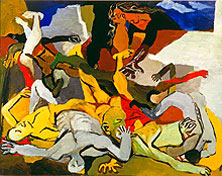New art exhibition takes a fresh look at the fall of Italian dictator Mussolini
Release Date 21 September 2010

The University of Reading's unique strength in modern Italian history has paved the way for a new exhibition set to open at a London gallery this week. Against Mussolini, Art and the Fall of a Dictato, charts the fall of Benito Mussolini through the eyes of Italian anti-fascist artists during the Second World War.
The exhibition has been curated by a team of academics led by Professor Stephen Gundle from the University of Warwick, and is part of a research project funded by the Arts and Humanities Research Council. It will be on display from Wednesday 22 September until 19 December 2010 at the Estorick Collection of Modern Italian Art in Canonbury Square in London.
The research project, which has run for four years, has examined how the cult of the Italian dictator Mussolini was organised and developed by the fascist regime in the inter-war years. Among its aims has been to explore the extent to which the cult was deliberately manufactured by the regime as a tool for building popular consensus, and to what degree the cult was believed in by ordinary Italians.
The project is a joint venture between the University of Reading, the University of Warwick and Royal Holloway University of London. In housing the Centre for Modern Italian History, Reading is the only university in the United Kingdom to have a designated post for an historian of modern Italy. The Centre's exceptional library and archival holdings have been key to the project's success.
Christopher Duggan, Professor of Modern Italian History at the University of Reading said: "The project has shown the exceptional power of the modern media to generate leadership cults, and the willingness of ordinary people to subscribe to them - especially when, as in the case of Mussolini, the cult was infused with overtly religious language and sentiment."
This exhibition is one of a number of research outputs related to the project. The project has been responsible for making three documentary films on the cult of Mussolini which will be screened at the exhibition venue.
Professor Gundle, Professor of Film and Television Studies at the University of Warwick said: "Several major exhibitions have explored the propaganda imagery of Fascist Italy, but art produced by those opposed to Mussolini and his regime has received surprisingly little attention. This exhibition brings together works produced in Italy and abroad throughout the Fascist era from 1922 to 1943 but mainly in the period that marked the regime's decline and fall between 1942 and 1945.
"Artists, some of whom had been aligned with the regime, provided a vivid and sometimes satirical portrayal of the national disenchantment with the dictator and his regime. Mussolini, who had been seen as a great new national hero, was painted as a bloated and mis-shapen monster or in grotesque animal form. The art produced in Italy during this tragic period stands as a lasting denunciation of the vanities of dictatorship and of the violence that is."
Notes to editors:
For more information please contact Kelly Parkes-Harrison, Communications Manager, University of Warwick, 02476 150483, 07824 540863, k.e.parkes@warwick.ac.uk
For all University of Reading media enquiries please contact James Barr, Press Officer tel. 0118 378 7115 or email j.w.barr@reading.ac.uk
The University of Reading is the United Kingdom's leading centre for the study of modern Italian history. It is the only university in the United Kingdom to have a designated post for an historian of modern Italy. Its library holdings on Italy are unique, and comprise more than 20,000 volumes, over 130 periodical titles, and important archive and newspaper collections. The Centre for Modern Italian History (CMIH) has been set up to utilise these holdings to the full, promote postgraduate study of modern Italian history in Britain, and foster links with scholars in Italy and other overseas countries.
Arts & Humanities Research Council (AHRC): Each year the AHRC provides approximately £102 million from the Government to support research and postgraduate study in the arts and humanities, from languages and law, archaeology and English literature to design and creative and performing arts. In any one year, the AHRC makes approximately 700 research awards and around 1,350 postgraduate awards. Awards are made after a rigorous peer review process, to ensure that only applications of the highest quality are funded. The quality and range of research supported by this investment of public funds not only provides social and cultural benefits but also contributes to the economic success of the UK. www.ahrc.ac.uk
